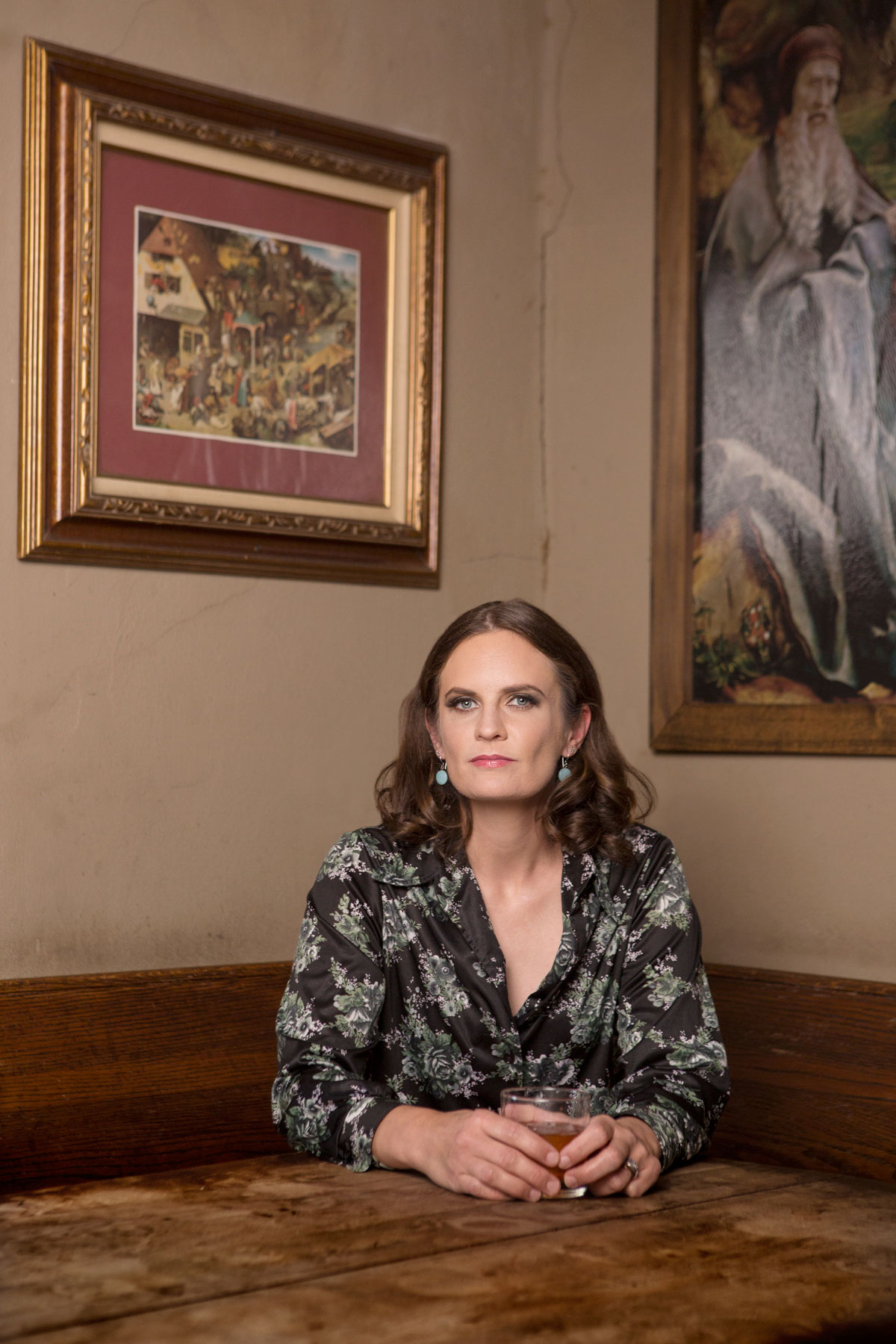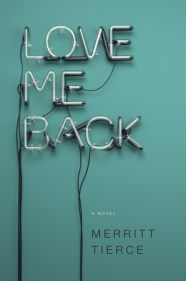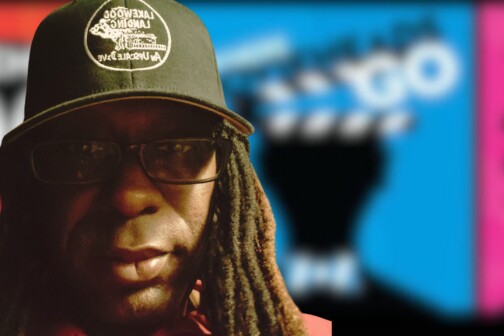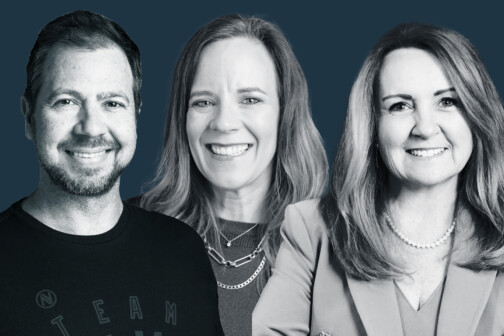In our September issue, I wrote a little ditty on Merritt’s Tierce’s first novel, Love Me Back (Doubleday), which comes out Tuesday. You should pre-order it right here. As I said in our pages, “it is a beautifully bleak, sex- and drug-filled story.” Yes, I just quoted myself. Writing for Texas Monthly, Michael Ennis said, “[T]his first novel could well emerge as a milestone in Texas literature.” Seriously. It’s a great book. Tierce is a protégé of Ben Fountain’s. I’m not saying this book is going to do what Billy Lynn’s Long Halftime Walk did. But this book belongs on the same shelf. In fact, these two books can be read as companion pieces that explore some of the same themes — alienation, excess, money — in two very Dallas settings, a Cowboys game and a steakhouse.
Anyway, the book’s narrator is a sexually adventuresome (and deeply damaged) waitress named Marie. Much of her story takes place in a steak joint she calls The Restaurant. The book is autobiographical, though, and Tierce worked for years at Nick & Sam’s. So while The Restaurant isn’t exactly Nick & Sam’s, it’s pretty much Nick & Sam’s. Folks who know the score will recognize real-life Dallas characters in the book.
For the magazine piece, I just had Tierce tell funny stories about celebrities she has waited on. (She was really high on coke when she waited on George Clooney.) There was a whole bunch of stuff, though, that Tierce and I talked about that I didn’t have space for. Like, you know, what’s Joe Palladino going to think about this book and all the screwing and snorting it suggests goes down in his restaurant? Here’s a transcript of the material that didn’t make it into the magazine:
I have to tell you that this book hurts my heart.
Oh, good! Good, I love hearing that.
I mean that as a compliment. I’m really having a hard time — I keep having to remind myself that you’re not that character. I think that’s part of my problem, because I know you. Not well, but we’ve met. And I keep having to tell myself, “This is not Merritt. You are not reading about Merritt.”

[laughs] Good luck with that.
Assure me that that character has almost no relationship to you. Even though you were both waiters, it ends there. I hope.
Is that what you want to hear, Tim?
I think so. I don’t know. I guess I want to know the truth, but I’m not sure I can handle it.
The book draws heavily on my own experience, for sure. It was written as fiction specifically so I could have some distance. I mean, it wasn’t intentional, but I never thought about writing a memoir. I was always trying to tell a story. And not all of it is true. I did invent some shit. But, you know, a lot of it comes from personal experience.
Your husband has read it, I assume?
[chuckles] He actually has not read it. I mean, he’s probably read three-fourths of it as stories. But the stories he hasn’t read are some of the heavy hitters towards the end of the book. He’s a big video-games nerd, and after he’d read a couple, I gave him another one, and he said, “Man, every time I read another one of these, I feel like I’ve leveled up.” So yeah. You get, like, grandmaster by the end.
You know what? I’ve found that I can’t read the book in public. I was waiting for a ride outside our building yesterday, and I was reading it. And, uh, I don’t want to share more details than I ought to with you. But there are just some sections that are hard to read in public. [laughs nervously]
Yeah, yeah. You’re blushing. You want to make sure you have your clothes on. Yeah.
It filled with me all sorts of conflicting emotions. This is sad but this is also sexy.
Good.
Talk to me a little bit about how you wrote the book. Because, as I understand it, you didn’t just sit down and go, “I know this is my story, the arc from beginning to end.” You did it piecemeal, right?
Yeah. I never set out to write a novel. I’ve always been too intimidated by the thought of it, actually. You mention the word “arc.” I’ve actually been criticized — I guess some people consider it criticism — but some people will say the book doesn’t really have an arc. There’s no change. There’s no epiphany. There’s no transformation. It’s not like she really gets from here to there, in the traditional sense. I did write it as stories, without a book in mind. The first story I ever wrote and published was called “Suck It,” and that story kind of anchors the book in the middle. I just kept writing, and I kept writing stories set in a restaurant that featured some of the same characters. After I’d written about six of those, that was about the time I got an agent and things started happening.
So you sold it based on six interrelated stories you’d written?
Yeah. Actually, I think I had eight by then. My agent wisely put it out in the world without saying it was a story collection or a novel. She just said it was a debut or a book. And we sold it as a novel. I wrote the interstitial pieces after we sold it. When I go back now, those are some of my favorite parts. So I’m actually glad I was pushed to make it into a more cohesive book.
Let’s address the Nick & Sam’s issue, because you told me in email that this is not a tell-all, behind-the-scenes look at Nick & Sam’s. Marie, for example, says she works at Chili’s and the Olive Garden. But then, when she gets to the steakhouse, she calls it The Restaurant. So why didn’t you use the name in the book?
Because Chili’s and the Olive Garden are chains, and they’re pretty much the same anywhere you go, and I didn’t feel like that had as much significance as Nick & Sam’s, which there’s only one. I also didn’t want anyone to think that this culture that’s described is specific to Nick & Sam’s. As I was writing the stories that are set at the steakhouse, I gave the restaurant several different aliases, none of which I liked. Eventually I just called it The Restaurant, which I felt the best about because it was an obvious indicator that you shouldn’t think about it as any particular place. But, I don’t know. I have no idea what the management — I’m mainly concerned about Joe Palladino and Phil Romano. It’s not like they sit around reading debut literary fiction.
[laughing] You don’t know that.
Yes, yeah. You should never underestimate the powerful. It’s possible they might not read the book even if they hear about it. I have no idea how they would respond to it. So I don’t want to rub it in anyone’s face by calling it Nick & Sam’s and forcing anyone who is associated with Nick & Sam’s to answer for it. Also, that place was insane, and I am often surprised that I survived, but it helped me — maybe I had to sell my soul, but it got me through seven years of my life and let me put clothes on my kids and feed them. And I love to death some of the people who work there.
Why do you say sell your soul? It would be one thing if you were writing ads for cigarette companies. But why do you look at waiting tables there as having sold your soul?
Anytime you are in a position where you feel you are forced to choose between a certain kind of performance that will let you maintain whatever stability you’ve grabbed onto in your life, as opposed to responding to events in a more authentic way or a way that is more true to your actual feelings and who you are — I feel like that is a real compromise. And I did that over and over, almost every night.
But life is a series of performances, to one degree or another, you know? All you were doing was bringing expensive food to people who could afford to eat it. I get what you’re saying, but to me it just seems like you’re being a little hard on yourself if you say that what you did involved selling your soul. I mean, it wasn’t evil what you were doing.
No, you’re right. It was pretty banal. It was just bringing expensive food to expensive people. But, um, at that level of service there’s a whole — you have to suppress all kinds of things that make you human in order to pretend like the person you’re waiting on is so important. The implication is that they are much more important in life than you are. And you’re there to perform that, specifically. It doesn’t have a whole lot to do with the food.
Yeah, I get that. I still say you’re being too hard on yourself.
Part of it that I haven’t really talked about yet has to do with explicitly being a woman in that culture and having to act like I don’t notice the blatant misogyny and the, like, sexual harassment and all of it that’s just rampant and letting people touch me while they’re talking to me — all these things that, if I weren’t wearing that uniform and standing in that place, I would probably have a very different reaction to.
Are there things that you miss about it?
Yeah, there are. I mean, I miss the people mainly. I say this in the book, but anytime you are thrown into a really intense scenario with a bunch people, you inevitably bond deeply with some of them and become mortal enemies with some of them, too. I mean, it is just serving meat, so obviously it’s nothing like being in the military. But you have a mission, and you’re all doing it together, and some of you are great at it, and some of you suck. That’s a soup for all kinds of interesting things to happen. And at the end of it, you feel really spent, and you need to go somewhere with those people and, like, download it. I miss that. I’m never really challenged like that now. Physically, I’m never exhausted the way I was for years. I didn’t even realize it, but I was running on fumes for so long. There’s something really nice about it, about wearing yourself out. I was always hungry, too. Which now I’m never hungry. There’s nothing preventing me from eating now, when I’m hungry. When I was working at the restaurant, I was never able to eat when it was time to eat. Food tastes so good when you’re hungry.
I waited tables in college. I still have waiter nightmares where I’m in the weeds and I’ve completely forgotten to put in my entire section’s orders, and everybody is pissed off. Do you have those?
Yeah, I do. I’ve heard those never end. The nightmarish part for me is that I can never get back to my table. You know in dreams when you’re trying to run and you just can’t? I keep trying to get back to them, but I can’t, and at some point it’s like “I’m fucked now. Even when I get back there, they’re going to be so mad.” That was the feeling that was the worst for me when I was waiting tables. Like, some people care most about what the management thinks because they control whether or not you have a job, more or less. So they’ll do what they can to stay in good with the management. And some people care most about what the guests think, so that’s what they’ll prioritize. And you would think the management would want you to prioritize that. But the way a restaurant at that price point makes money is by doing a lot of volume, and you can’t do a lot of volume without making everybody do a ton of shit really fast. A lot of times, I would not run food as much as other people because I was trying to make sure my table was happy. Yeah, so, I still have nightmares about that.






